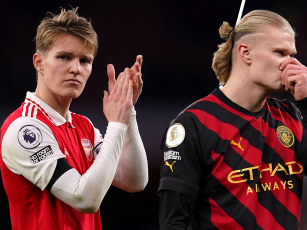In 2008, Spain began a cycle of dominance of world football the likes of which hasn’t been seen in decades, and is unlikely to be repeated for another few decades to come.
Qualification for the tournament began shortly after the 2006 World Cup, and the wounds were still raw for a Spanish side which, much like the Irish a few years later, felt that they had been wronged by one Thierry Henry.
A series of clashes throughout their round of 16 match-up with Carles Puyol ended with the Catalan conceding a crucial free as he looked to block off the Arsenal striker’s path to the ball. Henry went down holding his face, doing his best to make the referee reach for the red, but the damage was done as the resulting set piece was headed home by Patrick Vieira.
While that wasn’t the driving force behind their qualification, it was perhaps a bit of needle that the team may have needed as they went about finally fulfilling their potential as a footballing force. Despite decades of dominance from their clubs in Europe (namely Real Madrid) they had failed to really achieve anything on the international stage. Aside from their win in 1964, they had consistently underachieved and it had gone beyond the bounds of a punditry cliché to say that Spain were the ‘dark horses’ at this year’s tournament, whether that was the Euros or the World Cup.
Inevitably the pundits who backed them were often left disappointed when Spain somehow contributed to their own demise.
Their history in the game was that of nearly men; they proved that they had the skill and the resilience to perform at their best against some of the game’s most feared teams, but came apart at the seams when they were odds on favourites.
If 2006 had been down to Henry, 2002 was the fault of the referee against South Korea, but the signs of a capitulation were there already in an unspectacular game against Ireland which featured Fernando Hierro doing his best to gift Mick McCarthy’s team a penalty by attempting to swap shirts with Niall Quinn before the final whistle had gone.
In 1998, it was Andoni Zubizareta’s error against Nigeria that broke Spanish hearts. In 1996 they made hard work of their group and proved unable to beat England on penalties. In 1994, despite playing some good football during the tournament, they were beaten by their old nemesis Italy, furthering a rivalry and dislike between the two sides. And on and on the list goes. It perhaps even stretches back to the World Cup in 1930 - the inaugural tournament in which Spain could maybe have surprised a few teams, but the federation’s finances were in no shape to give them the chance to travel.
The weight of all those yeas of expectation weighed heavy on the shoulders of every team that put on the shirt of la furia roja throughout the years, and saddled them with a burden that proved too much for even the great players down the years, from Gento and Samitier to Raúl and Fernando Hierro.
Eventually, the weight was to be lifted, and in spectacular fashion too. At the peak of their powers, a unique generation of footballers that may well be remembered as one of the best that the world has ever seen changed the fate of a nation.
As manager, the late Luis Aragonés hit the headlines for all the wrong reasons with his comments about Thierry Henry as he attempted to inspire some confidence in the mercurial Jose Antonio Reyes, and he came under renewed pressure on the pitch as his team suffered a famous defeat against Northern Ireland in the qualifiers courtesy of a David Healy hat-trick.
Although they went on to win almost all of the rest of their games in that campaign, the significance of that low point in Windsor Park cannot be understated. Coupled with the loss at the World Cup, Aragonés decided that changes were needed in the team, and opted to drop legendary striker Raúl. Spain's leading goalscorer, the biggest figure in the dressing room and a national hero, it was a move that needed to produce results.
The influence of the Madrid star was perhaps one of the key reasons he had to be dropped. With him in the team, the temptation to play to his strengths, rather than focus on getting the best out of the team as a whole. The move towards a short passing style would not have suited Raúl, and it was a powerful message about players being selected on form rather than reputation.
Despite being just 28, Raúl was starting to struggle when it came to finding the back of the net: between 2004-07, he scored as many goals as he had in the 2000-01 season alone. While he wasn't exactly a lazy player, his game was based around goals, and if they dried up he wasn't bringing enough to the team in the opinion of the manager.
He wasn't the only man to lose his place either, as Michel Salgado was sacrificed in favour of Joan Capdevila, while Valencia's Miguel Ángel Angulo was also introduced. At the core of the team were Barcelona players whose influence on and off the pitch grew in the absence of Real Madrid's star man, and defined a style of play which the late commentator Andrés Montes was to famously dub 'tiki taka'.
In the tournaments that followed after 2008, Spain became more conservative and placed a greater value on possession, perhaps given the predominance of a coach by the name of Pep Guardiola at that time - his high pressure system, and the lack of a mercurial player the likes of Lionel Messi in the Spanish with which to open defences, meant that they played with some of the characteristics typical of Barcelona, but had to approach things a bit differently in the final third.
The successes of 2010 and 2012 under Vicente Del Bosque were more similar to what Arsène Wenger might have once called "sterile domination" (had his own team not since become exponents of the style), but Spain’s campaign in Austria and Switzerland was positively swashbuckling by comparison.
Their group featured the surprise package of the tournament in Russia, holders Greece, and Sweden, and they came out of it unscathed. In fact, they started their campaign with a statement of intent, beating Russia by a scoreline of 4-1. Their next two games were a little less comfortable, winning both by a single goal, but the start that they had made against arguably the strongest team in the group was a confidence boost that carried them through to the group stages.
The biggest difference between the style of play employed in 2008 and that which Spain used in later tournaments was the shape of the team. With Fernando Torres and David Villa at the peak of their powers, Spain had two frightening attacking talents who could stretch defences and find space, while the metronome in the middle of the field Xavi had the vision to spot the holes they were creating with their running. There was no false nine here; Aragonés put his team out on the pitch in a 4-4-2 formation with the fluidity to move around as the flow of the game dictated.
With David Silva on the left and Andrés Iniesta on the right, defences had to be mindful not only of the two strikers, but of denying space out wide to two creative players who were more than capable of hurting them if squeezed into the middle too. Sitting behind them, Xavi and Marcos Senna dictated the pace of the team and kept the ball moving constantly, but with one big difference: it was constantly going forward.
The criticism that the Barcelona man was a "sideways passer" was one that was espoused by pundits in this country and abroad alike, with The Daily Mail famously putting him down in their headline about the 2009 Ballon d'Or ceremony.

2008 was the example of tiki taka at its finest in the international setting, however, even if The Daily Mail weren't fans. Italy, the old enemy, were once again waiting for Spain when they came out of the group stages. In truth, Spain had the better of the exchanges in the game, with Senna almost forcing a very rare mistake from Gianluigi Buffon from distance.
With just seconds to go, Santi Cazorla's ball across the box almost found David Villa for a tap in, but the former Real Zaragoza man simply couldn't reach it. Players and fans had their hands on their heads, as the ghosts of so many shootouts and eliminations began to resurface.
However, they made (almost) no mistakes in the shootout, with Danny Güiza the only man to misfire from the spot. Casillas guessed the right way for all of them, saving from De Rossi and later from Di Natale, before immediately turning to his celebrating team-mates and gesturing for calm. He knew what was on the line, as the 21-year-old Cesc Fàbregas still had to take the decisive penalty.

Image: Spain's Iker Casillas saves a penalty from Daniele De Rossi during the penalty shootout in the quarterfinal match between Spain and Italy in Vienna. (AP Photo/Martin Meissner)
His well struck penalty to the right brought about scenes of joyous celebration. Not only had they finally made past the quarter-final, they had beaten the team who they perhaps feared the most in the competition, not solely on quality (they had won the World Cup just two years earlier) but also on reputation given their personal history with them.
Their next match went somewhat more to plan as they beat Russia 3-0, but the big blow was the loss of David Villa, who left the field with tears in his eyes as he realised that the injury he sustained in taking a free kick would rule him out of the final. Iniesta set up Xavi for the opener, Güiza made amends for his missed penalty with a stunning second and Fàbregas and Silva combined for the third to wrap up a phenomenal performance.
With Germany awaiting in the decider, Aragonés chose his words carefully as he turned to his squad and told them that "you don't play a final, you win it."
Having managed Fernando Torres at Atlético Madrid, he also knew how to get the best out of his striker, who would be key in the absence of Villa. While he wasn't quite on the money with his prediction that he would break his drought by scoring two goals, it was the Liverpool man who was on target for the first time since the group stage. He could have had more as he headed against the post, while Jens Lehmann's performance (apart from the moment he rushed out to meet Torres, who skilfully lifted the ball over him) prevented the game getting away from Germany entirely.
They were blown away by the movement and the incisive passing of a midfield generation who had finally broken the cycle of disappointment which had come to characterise the national side. Nearly 50 years on from their only previous success on the international stage, they were finally able to go to big tournaments with the favourites tag not weighing them down, but giving them confidence.
A World Cup win in 2010 and a successful defence of their European Championship title in 2012 confirmed that this Spanish team was the type of thing we are only privileged enough to witness once in a lifetime, but 2008 was them at their raw and most beautiful best; like the stunning debut album of your favourite band before they made it big.
As the team accepted the trophy, Sergio Ramos pulled on a t-shirt in tribute to the late Antonia Puerta, making the moment even more special. Coupled with the unusual squad choices which brought characters such as Capdevila and the in-form Güiza into the fold, outside of their attacking playing style, Spain proved to be incredibly likeable. They weren't one of the usual winners, they were a team that had finally achieved after years of failure and reached their true potential.
On the verge of a famous three-peat, they enter Euro 2016 with a somewhat lower profile than previous tournaments after a disastrous World Cup, but much like many of the other European teams that are touted as having the know-how and nous to get the job done when it comes to tournament football, you can no longer count out the Spanish.
Download the brand new OffTheBall App in the Play Store & App Store right now! We've got you covered!
Subscribe to OffTheBall's YouTube channel for more videos, like us on Facebook or follow us on Twitter for the latest sporting news and content.








